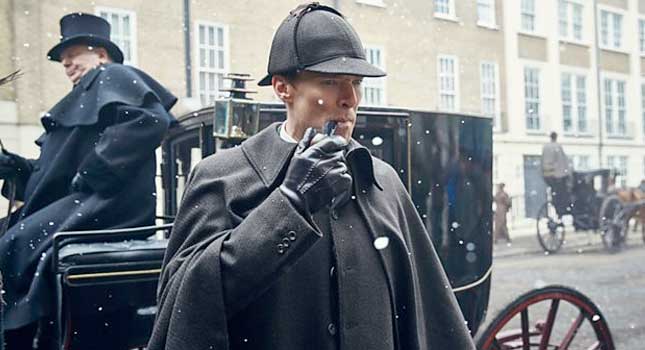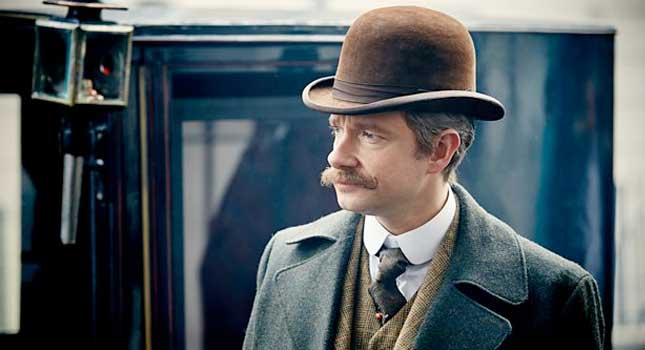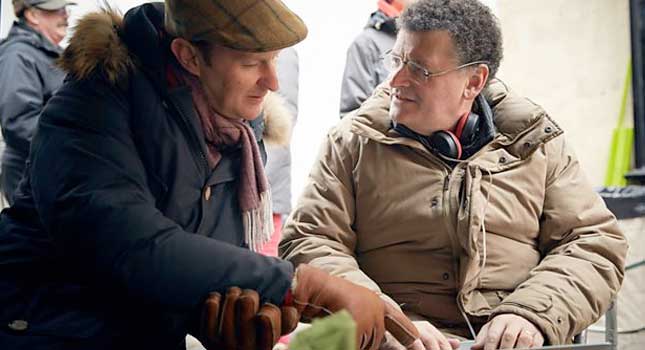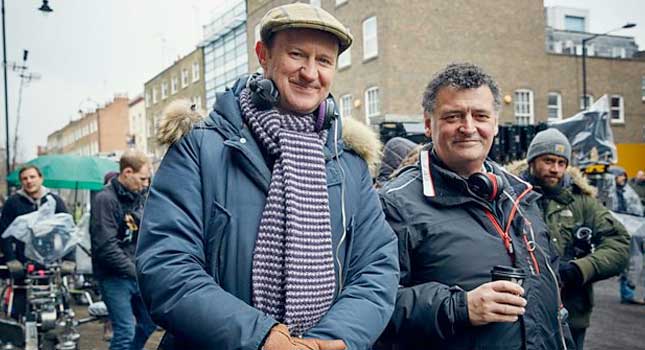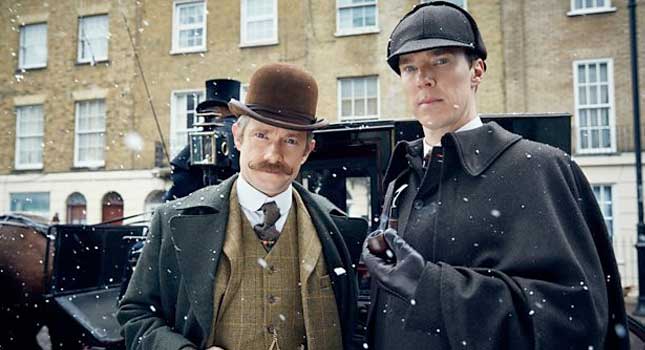
Kristina Manente, co-host on The Baker Street Babes’ podcast
Do you think the dynamic of the show will be altered with the change of period to Victorian-era London?
Not in the least. Benedict Cumberbatch and Martin Freeman have distinguished themselves as Holmes and Watson utterly and completely. They’ve created their own versions of the detective and doctor, but they are unequivocally also the characters from the original stories. The partnership they portray in Sherlock is wonderful and also very true to the canon, and putting them into the actual time period I think will only strengthen that and perhaps give it a bit of added validity to those who were ever skeptical of the modern day setting.
It’s true some characters’ roles will be changed a little, the women of the show will have Victorian constraints, but I have faith that they will still be the same characters we know and love, just in fancier clothing.
Steven Doyle, Publisher, The Baker Street Journal
What do you think about the concept of the time-shift setting for Sherlock: The Abominable Bride?
I’m quite interested in how this time-shifted episode will come off. The series has had such a unique success at transplanting Holmes and Watson to present-day, one wonders if they will be able to manage it in the duo’s original time period.
What story from the original Arthur Conan Doyle canon would you most like to see retold that hasn’t already been covered?
That’s a difficult question as, thanks to Granada Television’s series with Jeremy Brett, the majority of the original stories (47 out of 60) have been done. This, of course, doesn’t take into account that there have been hundreds of other television and film adaptations. If you are talking about the Sherlock series, I think I’d like them to do The Hound of the Baskervilles as a straight up adaptation rather than the episode they did with a similar title.
How have you been whiling away the time since Benedict Cumberbatch and Martin Freeman’s last outing as the Baker Street duo?
Well, Sherlock isn’t the be all and end all of Sherlockian activity. It may seem that way to those who only know Holmes through the series, but there’s plenty of other ways to celebrate the character. Some of mine include reading and writing about Holmes, publishing books for Wessex Press/Gasogene Books (the premier publisher of Sherlockian titles in the world), attending conferences and meetings of various Sherlock Holmes societies.
If you could ask Arthur Conan Doyle one question what would it be?
Did you really come to hate Sherlock Holmes?
What has been your favourite episode of Sherlock to-date and what made it stand out more than the others?
Hands down, A Study In Pink, followed by Scandal In Belgravia. The sheer shock and revelation of Holmes and Watson successfully transplanted to 21st Century London was amazing.
If you wrote your own Sherlock episode what would the story be about?
Well, I don’t write pastiche, but I know it would be about a more down to earth crime…murder, robbery, etc., rather than the kind of things the show found itself doing in Season Three.
If you were to be cast in the series, what kind of character would you be?
Probably a client.
Do you think you’ll prefer the Victorian or the modern day incarnation of Sherlock?
Hard to say. Ask me again after I’ve seen Abominable Bride.
Benedict Cumberbatch interview
What did you make of the Victorian setting?
I thought it was madness. I thought they’d finally lost the plot, jumped the shark, all the other clichés of television gone mad with itself. Then they expanded the idea and pitched it to me properly and I think it’s fantastic. Absolutely brilliant.
How will fans react?
I don’t really know how the fans are going to react to it. I think that’s one of the joys of doing it like this. We haven’t disappointed fans in the past, it seems, so hopefully this won’t. I hope they enjoy it.
What was it like being transported back in time?
Great fun to play, and I mean, great, great fun. To muck around with a pipe and a deerstalker for real is wonderful. And then, as far as the background, the setting, the scenery, all the rest of it, it’s just a delight. It always is with period drama. You kind of marvel at it.
What’s the funniest thing that happened on the set of The Abominable Bride?
Martin Freeman is probably the funniest thing that happened on set. He tends to be quite funny in general. So, when he’s on set, he’s funny. It’s a weak answer, but it’s the truth – you don’t have to look far for comedy on set.
Martin Freeman interview
How does the setting affect the dynamic of the show?
It changes the dynamic of filming because everything does take longer: it takes longer to get dressed, you’re longer in make-up, you’re longer in wardrobe and camera resets take longer just because there’s more stuff about. The clothes that we’re wearing and the stuff we are dealing with as far as make-up and hair is concerned, are not everyday things that people have to deal with.
But as far as the dynamic is concerned, everything is slightly more formal. The way that we’re doing it is with a touch more formality, but you don’t want to completely change those characters that people have come to know and love. I’m still recognisably John and Ben’s still recognisably Sherlock.
Which Sherlock character are you most like in real life?
I don’t know that I’m like many of the Sherlock characters in real life because I wouldn’t really want to do the two things that John Watson does for a living, which is doctoring and soldiering. I’m very interested in both of those, but I’d rather not be sewing people up on a battlefield, hence becoming an actor. I’m not as clever as Sherlock. I might be Lestrade, or Mrs Hudson, because I like making people tea. I’m quite caring, I like looking after people.
Steven Moffatt interview
How did you approach the Victorian setting?
It was irresistible to do a special that is Victorian and say, this is what it would’ve been had we done it authentically. Thereafter it affects everything and it’s hugely different, because as we’ve done it properly Victorian – we had to remake our 221B set.
Were there any challenges in creating the special episode?
We instantly had the problem of period settings and so on, whereas before we just turned the camera on and pointed it at London.
There was the CGI needed to recreate a Victorian London that you believe in. In terms of the writing, we wanted to keep faith with our version of those characters, and yet put them in a Doyle setting, with a Doyle sort of style of presentation, so it sort of splits the difference. I don’t think Sherlock Holmes himself talks all that differently because the modern-day Holmes talks very much like the Victorian Holmes. In fact, if you look at the modern version of the show, he sounds more and more Victorian every year because Benedict suits that. Doctor Watson is a bit different. He presents himself more as the traditional Doctor Watson but you realise something else is going on underneath.
How will fans react to the Victorian setting?
It was so long ago that people were asking us, how will they react to the modern setting? I think if they enjoy Sherlock, they’ll enjoy this show. But it is a very, very different episode. As they say, a very special episode.
Mark Gatiss interview
When did you first get the idea for a Victorian version of Sherlock?
The night that it first formed was when we were doing the publicity shots for Series Three. Me and Steven Moffat were out in the freezing cold night and we started to come up with it.
What happened when you told the rest of the team about the idea?
Well, when we pitched it to Benedict and Martin it was a very unusual situation because Rathbone and Bruce are the only people who have done both, until now. From the point that we fell in love with Sherlock Holmes and Doctor Watson in their original incarnation, the whole idea of making it 21st-century was what became the exciting new part of it. But obviously, to do it with gas lamps and top hats and hansom cabs, as a full-on sort of Gothic treat is completely irresistible.
Did you have to persuade the actors?
No, hilariously, because Benedict’s been agitating for a haircut since the beginning of the show. So, we breathlessly pitched it as this ‘it’s 1895, we’ll just do it…’ We told him the story, the case and everything. He was sort of agog and then went “Can I have my hair cut?” That was it… that was easy. And Martin just loved the idea.
How did you deal with technology going back in time?
We’re retro-engineering all the questions we got six years ago. How are we going to deal with it? The way that Doyle did! The point is, as we said when we were initially modernising it, Holmes was a modern man.
If you read the original stories, it’s all in there. For example there’s a telephone in Baker Street. He wasn’t living in an antique world – he wanted everything as quickly as possible.


